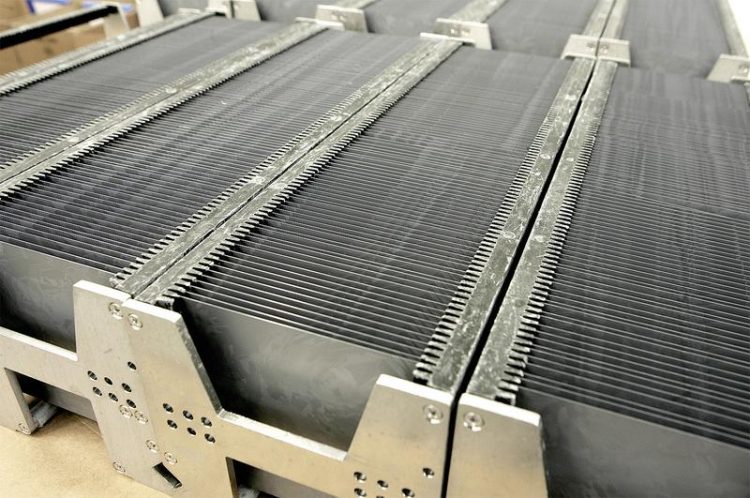Solar cells: Optimised growth and sawing of crystals

The produced wafers are ready for the next steps on the path to the module. © SolarWorld GmbH
The first makes it possible to produce quasi-monocrystalline silicon with a significantly lower energy requirement and at the same time obtain a very pure, high-quality silicon. The second reduces the material losses when the silicon ingots are sawn into many thin slices (wafers). The new sawing technology will enable more wafers to be obtained from the same amount of silicon.
Silicon wafers will soon be as thin as paper
Researchers have developed a new crucible-free crystal growing process for quasi-monocrystalline silicon. Cells from this material reach an efficiency of 21%, which is comparable to standard monocrystalline cells but with lower production costs.
On the way from silicon to solar modules, the silicon ingots are sawn into thin wafers. Here a new type of diamond wire with a specially adapted cooling liquid has proved its worth. This makes it possible to saw the wafers faster and with significantly lower material losses. In addition, this system can be used to reduce the wafer thickness from the current 180 μm to 100 μm in future.
The widespread silicon photovoltaics sector will enable the optimised production processes for crystallisation and wafering to be easily integrated into existing production lines. SolarWorld Innovations GmbH (SWIN) carried out the project together with partners from the scientific community.
You found all informations about the BINE Projektinfo brochure entitled “Cheaper production of solar cells” here:
http://www.bine.info/en/press/press-releases/press/pressemitteilung/solarzellen-…
Uwe Milles/Birgit Schneider
presse(at)bine.info
About BINE Information Service
Energy research for practical applications
The BINE Information Service reports on energy research topics, such as new materials, systems and components, as well as innovative concepts and methods. The knowledge gained is incorporated into the implementation of new technologies in practice, because first-rate information provides a basis for pioneering decisions, whether in the planning of energy-optimised buildings, increasing the efficiency of industrial processes, or integrating renewable energy sources into existing systems.
About FIZ Karlsruhe
FIZ Karlsruhe – Leibniz Institute for Information Infrastructure is a not-for-profit organization with the public mission to make sci-tech information from all over the world publicly available and to provide related services in order to support the national and international transfer of knowledge and the promotion of innovation.
Our business areas:
• STN International – the world’s leading online service for research and patent information in science and technology
• KnowEsis – innovative eScience solutions to support the process of research in all its stages, and throughout all scientific disciplines
• Databases and Information Services – Databases and science portals in mathematics, computer science, crystallography, chemistry, and energy technology
FIZ Karlsruhe is a member of the Leibniz Association (WGL) which consists of 87 German research and infrastructure institutions.
http://www.bine.info/en – BINE Informationsdienst
Media Contact
All latest news from the category: Power and Electrical Engineering
This topic covers issues related to energy generation, conversion, transportation and consumption and how the industry is addressing the challenge of energy efficiency in general.
innovations-report provides in-depth and informative reports and articles on subjects ranging from wind energy, fuel cell technology, solar energy, geothermal energy, petroleum, gas, nuclear engineering, alternative energy and energy efficiency to fusion, hydrogen and superconductor technologies.
Newest articles

A ‘language’ for ML models to predict nanopore properties
A large number of 2D materials like graphene can have nanopores – small holes formed by missing atoms through which foreign substances can pass. The properties of these nanopores dictate many…

Clinically validated, wearable ultrasound patch
… for continuous blood pressure monitoring. A team of researchers at the University of California San Diego has developed a new and improved wearable ultrasound patch for continuous and noninvasive…

A new puzzle piece for string theory research
Dr. Ksenia Fedosova from the Cluster of Excellence Mathematics Münster, along with an international research team, has proven a conjecture in string theory that physicists had proposed regarding certain equations….



